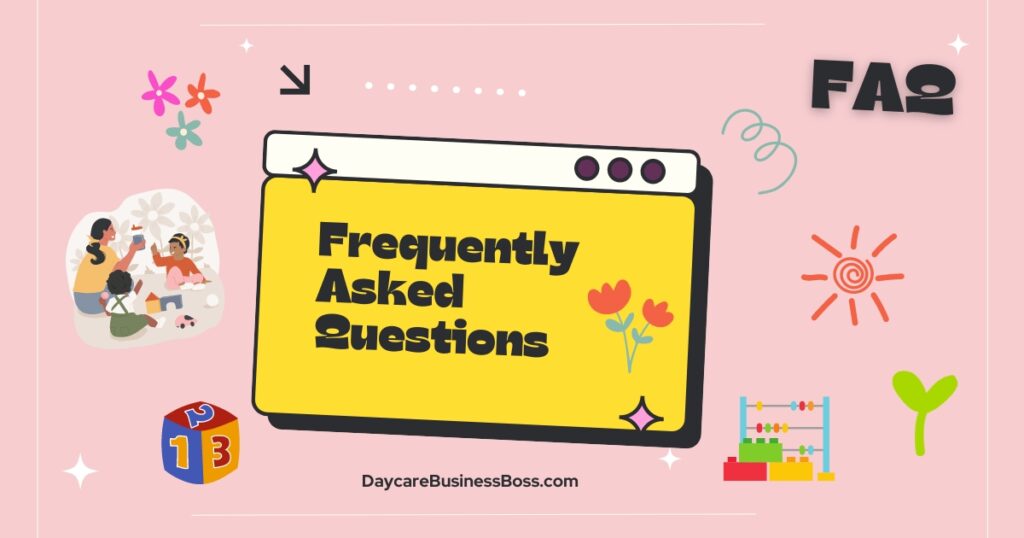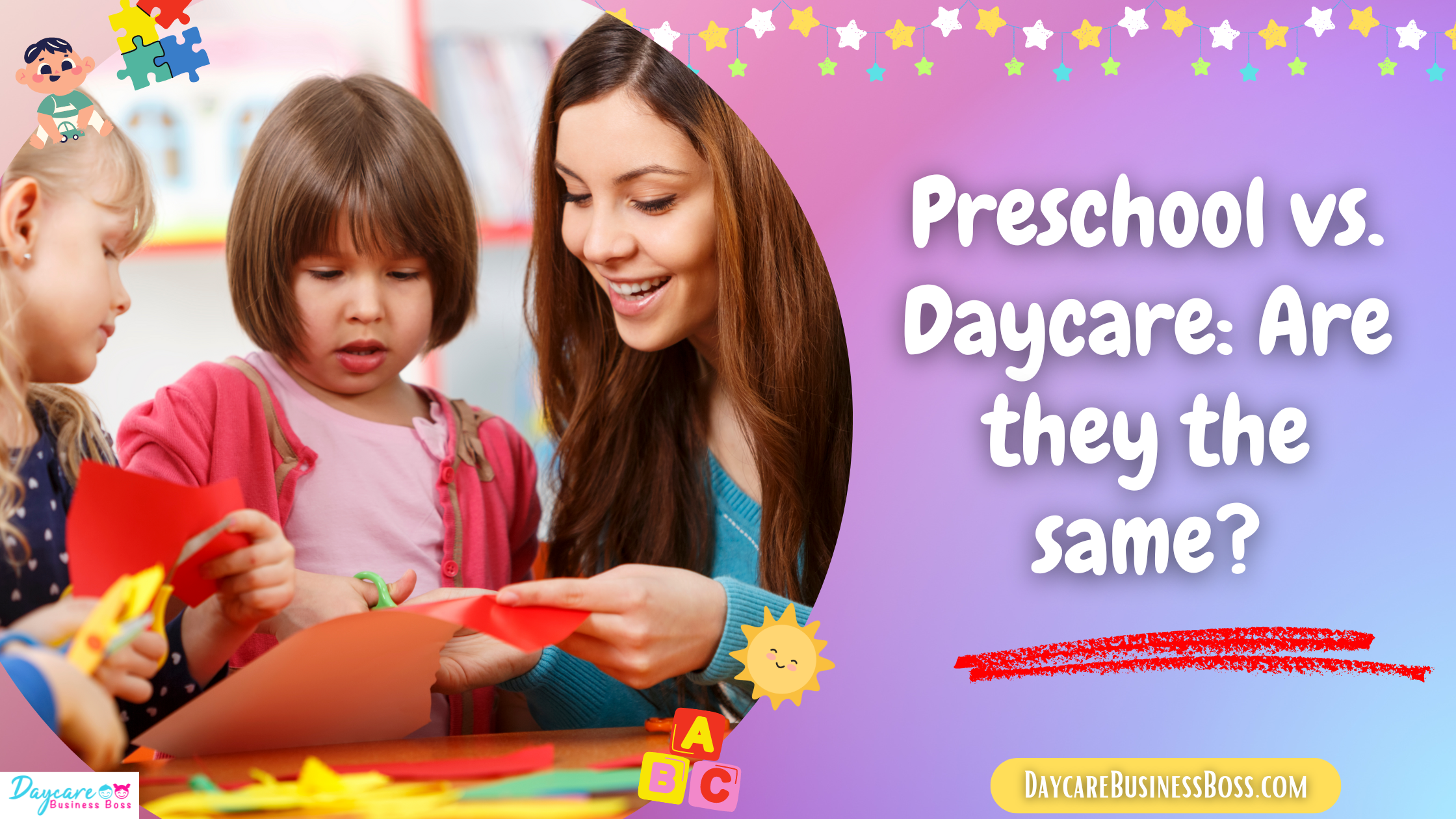Do you have children and are considering enrolling them in a program? Are you inundated with questions regarding what is best for your children? Tired of asking questions in your online mom group and receiving nothing but contradicting answers?
Preschool vs. Daycare: Are they the same? Though the words preschool and daycare seem to be used interchangeably, this is actually incorrect. While both forms of child care offer significant advantages to children, vast differences in structure, hours of operation, purpose, staffing requirements, and ages accepted.
If you’re contemplating which program will be best for you and your child, then this article has been written with you in mind. Grab your crayons, nap mat, and favorite Lunchable, and let’s get started!
What is a daycare?
By definition, a daycare is a program, facility, or organization that offers supervision and care for children or physically or mentally disabled adults. Though adult daycare is essential, our focus is going to be on child daycare.
Daycare focuses more on providing a safe environment for children of all ages to stay when their guardians or parents are working or otherwise engaged. Children in daycare can play and interact with others in the same age group. A daycare provides parents and guardians with the ability to work without having to worry about leaving their kiddo with a babysitter or incur the expense of enlisting a private nanny.
Daycares often do not follow the schedule of local schools, meaning hours of care offered will be longer than the regular school day, and the center will be open during holidays and school breaks.
Learn the 5 things parents look for in a daycare!
What is a preschool?

Preschool is an early childhood program that combines learning with play within a program run by professionally trained adults. Children between the ages of three and five are typically enrolled in a preschool program.
Preschools emphasize education and development rather than simply supervising the care of a child while they cannot be under the supervision of a guardian or parent.
Preschools often follow the schedules of their surrounding schools, meaning hours of care will be shorter than a daycare and closing for holidays and school breaks.
Got it! School vs. Care! What else should I know?
Now that we’ve gotten the definitions out of the way let’s hit the core differences in daycares and preschools.
Structure
- Daycares provide a daily structure, but it doesn’t typically mirror a school day structure. More often than not, you’ll find that a large chunk of the day is devoted to playtime.
- Preschools are structured similarly to a regular school day schedule, where activities and educational lessons occur at the same time each day.
Hours of Operation
- Daycare facilities typically have longer operating hours than a typical school and remain open during holidays and scheduled school breaks.
- Preschool hours mirror those of a typical elementary school and are often closed during holidays and school breaks, including summer break.
Purpose
- The primary purpose of daycare is to provide a child with a safe, supervised environment when they cannot be under the care of a parent or guardian.
- The mission of a preschool is to amply prepare children for kindergarten by providing lessons and structured activities.
Staffing Requirements
- Though many states require specific training for daycare workers, they do not need them to be certified/licensed teachers.
- Preschool teachers are licensed/certified teachers with training and education in early childhood education. Most states require preschool teachers to carry the same education, licensing, and certification as an educator in an elementary or primary school.
Ages Accepted
- Daycares welcome children in ages from itty-bitty babies to grade-school-aged children. This means that your precious toddler may actually have the opportunity to engage with older children while being around those younger than him/her.
- Preschools typically accept children ages three to five. The age groups tend to be separated into their own classroom settings, though they may have the opportunity to co-mingle during recess times.
Breaking it down: Preschool vs. Daycare in a glance
|
Preschool |
Daycare |
|
Childhood education and development are the primary focus. |
The primary focus is caring for and providing activity for children. |
|
Typically follows the open/close schedule of local schools. |
Extended hours, as well as holidays. |
|
Ages 2.5 – 5 years |
Wide range of ages: 6 weeks to older children |
|
Shorter hours of operation (again, mimics the hours of a typical school). |
Open for more extended hours that usually coincide with the hours a parent/guardian would work. |
|
Different preschools follow different curriculums and methodologies. |
More free-play, naptime, and informal learning. |
|
Certified and/or licensed teachers and aids. |
Workers may or may not have any background in early childhood or education. |
I’ve got the differences; what are the similarities?
The differences between daycares and preschools are pretty vast, but there are many similarities between the two. Here are a few things you’ll find consistently across the board:
- Both daycares and preschools require state licensing and accreditations to operate.
- The safety of children is the top priority of both.
- The cost of daycare and that of a preschool is similar.
How do I choose what is best for my child?
Now that you know the differences and similarities of daycares and preschools, it’s time to pull it in a little closer to the vest. Ask yourself these questions:
- What would you like your child to gain from his or her time while not in your care?
- Would you prefer those hours to be filled with purposeful learning or more social interaction and play?
- Do you prefer your child to be supervised by licensed teachers or a daycare worker with a zest for kiddos?
- What hours of care will your child need?
- What is your budget?
After answering these few questions, shift your focus to the specific child care centers in your area. Personally tour preschool and daycare options near your home or workplace. Include your child in these tours and gauge how your child responds to the teachers or daycare workers. Survey and take note of the overall environment and hygiene of the facility. View the toys and play areas. Openly ask teachers and staff questions regarding curriculum, teaching policies, how discipline is handled. Interact with parents whose children are currently enrolled in the programs and ask their true feelings on how they view their child is being cared for. Compare the centers’ hours of operation with your work schedule. Look at the kids leaving at the end of the day. Do they seem jubilant and well-cared for or do they seem tired, disinterested, and bored? Are the leaving children hugging and high-fiving staff, or are they jetting out the door? Lastly, and this is the most important thing, check to ensure that the child care facility is following all rules and regulations set forth by your state. Do a background check, check ratings, or find referrals to speak with.
There is no right or wrong answer as to which type of child care facility option is best. It simply comes down to your needs, wants, financial abilities, and availabilities in the facilities of your area.
Related Questions

1. Do some preschools offer extended hour care?
Yes! Many preschools offer extended care that mimics a daycare setting for both preschool-age and school-age children.
2. What if my child has food allergies?
If your child has food (or other) allergies, you’ll definitely need to inform your child’s preschool/daycare. Take note of how the facility will manage your child’s allergies and if a reaction does occur.
Please note: This blog post is for educational purposes only and does not constitute legal advice. Please consult a legal expert to address your specific needs.
To learn more on how to start your own daycare checkout my startup course and documents here.

Meet Shawn Chun: Entrepreneur and Childcare Business Fan.
I’m a happy individual who happens to be an entrepreneur. I have owned several types of businesses in my life from a coffee shop to an import and export business to an online review business plus a few more and now I create online daycare business resources for those interested in starting new ventures. It’s demanding work but I love it. I do it for those passionate about their business and their goals. That’s why when I meet a childcare business owner, I see myself. I know how hard the struggle is to retain clients, find good employees and keep the business growing all while trying to stay competitive.
That’s why I created Daycare Business Boss: I want to help childcare business owners like you build a thriving business that brings you endless joy and supports your ideal lifestyle.

